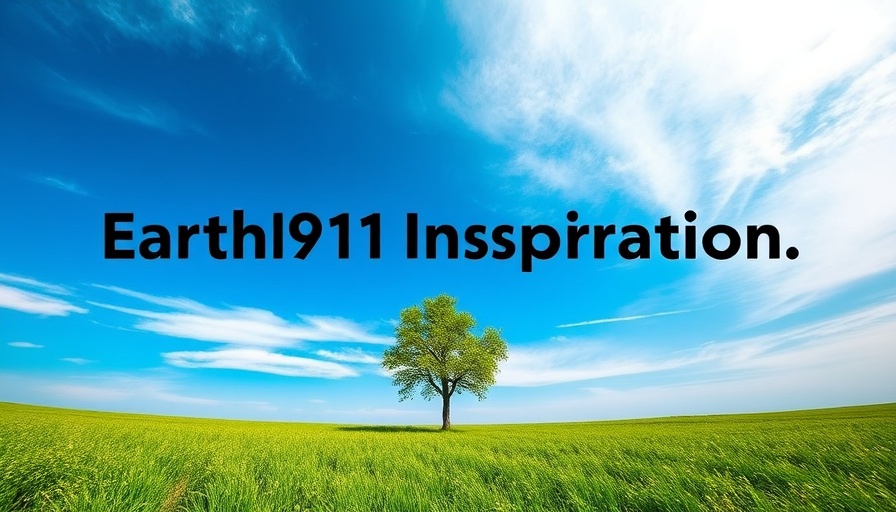
Finding Common Ground in Polarized Times
The ongoing conversation around climate change has highlighted a significant challenge—bridging the ideological chasm that often leaves individuals feeling at odds. The Earth911 podcast featuring author Kevin Wilhelm presents an essential framework for navigating these tumultuous discussions, particularly in light of today's heightened political divides. Wilhelm's book, How to Talk to the Other Side, offers real-world strategies for constructing meaningful dialogues amidst the chaos of differing beliefs.
Why Effective Communication Matters
As climate change becomes an increasingly divisive topic, the urgency for effective communication cannot be overstated. Recent studies indicate that nearly 78% of Americans align with one of the two major political parties regarding their views on climate, leading to a polarized discourse that hampers collaboration. When individuals feel dismissed or misunderstood, engaging in productive discussions becomes nearly impossible.
Research from human ecologist Thomas Dietz offers insights into this polarization—the concept of perceived polarization suggests that people often believe others' views are farther apart than they actually are. This misperception breeds defensiveness, making compromise feel unreachable. Wilhelm's approach advocates for structured conversations that foster understanding and dismantle these misconceptions, demonstrating that common ground can indeed be found, even in a fractious landscape.
Empathy Over Rhetoric
Wilhelm encourages listeners to embrace empathy while discussing contentious issues. By sharing personal stories and framing climate challenges in relatable terms, individuals can break down the walls that separate them from opponents. An excellent example is how farming communities discuss fluctuations in weather affecting their crops. Initiating these conversations with shared experiences cultivates a sense of camaraderie, rather than confrontation.
The effectiveness of empathy as a tool in political discourse is widely supported. In a polarized environment, fostering relationships and understanding will help garner cooperation even among those who may initially appear to be at odds. Such dialogue is not merely a skill but a necessary approach that allows communities to create actionable solutions towards climate resilience.
The Role of Generational Change
As noted during the podcast, younger generations, namely Millennials and Gen Z, display a significant shift in attitudes toward climate action. Regardless of political affiliation, these individuals increasingly recognize climate change as an urgent issue. This intergenerational understanding opens doors for more inclusive discussions where various viewpoints can align on actionable solutions.
Wilhelm highlights the importance of leveraging these generational shifts to drive conversations about climate adaptation, advocating for approaches that address economic benefits alongside environmental impact. By emphasizing the shared vulnerabilities associated with climate change, people on different sides of the political spectrum can identify incentives that resonate across the divide.
Real-World Applications: Bridging the Gap
In practical terms, translating Wilhelm’s insights into everyday interactions can profoundly influence the discourse surrounding climate change. Implementing structured discussions, as suggested by Dietz, can help diffuse tensions. Inviting diverse perspectives into community meetings, employing mediators, and setting ground rules allows for a more respectful exchange of ideas.
Further, organizations like OSF are conducting studies to explore effective interventions that bridge the political divide on climate change. Initial findings indicate that moral reframing — expressing climate actions in ways that resonate with opposing views — can foster cooperation. For instance, framing renewable energy as a means to create jobs can appeal to economic conservatives, while simultaneously appealing to liberals’ environmental concerns.
The Challenge Ahead: Overcoming Resistance
Of course, generating a change in discourse requires acknowledging the obstacles presented by entrenched views. Those resistant to accepting climate change often rely on existing narratives that reinforce their viewpoints. As Wilhelm suggests, the key is to focus on the commonalities rather than driving home the differences. Strategies that empower listeners to engage in these discussions without feeling threatened will have larger implications for how society tackles climate-related issues.
Call to Action: Join the Conversation
Now is the time to engage in meaningful conversations about climate change and social equity. Whether it’s joining community forums, engaging in structured discussions, or simply sharing stories of your experiences, each individual action can contribute to a larger movement of change. Embrace the challenges and opportunities posed by differing opinions, and together, we can form a united front for our planet's future.
 Add Row
Add Row  Add
Add 




Write A Comment